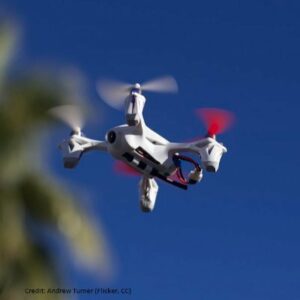Dr Anna Jackman is an Associate Professor in Human Geography at the University of Reading. Anna is a feminist political geographer interested in the impacts of robotic and digital geographies as they touch down in, and (re)shape, everyday, urban and military space and life. Information about Anna’s recent drone projects is provided below. You can read about Anna’s wider research (including States of Precarity, exploring academic precarity in HEI Geography) here.
Current research project: Future drone skies: Planning in volume
Anna is currently leading (with co-I Dr Paul Cureton, Lancaster) a British Academy Small Research grants project exploring the impact of drones upon UK built environments. From landing pads and charging stations to flight routing, drones raise critical yet under-examined questions about changing geographies of UK planning. Bringing together academics in geography and design, this interdisciplinary project employs a case study approach, engaging with both UK planners and publics through workshops, serious games and citizen crowdsources mapping, to address a major research gap surrounding the implications of drones in three-dimensional (volumetric) airspace for UK built environments and the lived experiences of residents in their midst.
Previous research project: Urban life and design in the drone age
Anna previously lead (with co-I Dr Paul Cureton, Lancaster) a University of Reading funded project, ‘Urban life and design in the drone age’. From infrastructure inspection and commercial delivery to emergency services, drones increasingly feature in UK skies. Drones enable diverse urban applications and are associated with economic, social, and sustainability benefits. Yet, while a 2022 UK Government ambition statement outlines aims for commercial drones to be ‘commonplace by 2030’, it remains that drones variously impact urban populations and built environments. Data-capturing drones prompt concerns around privacy, visual and noise pollution, and the drone’s reliance on digital and physical infrastructures, from air traffic management to landing pads, raises timely questions about urban design. Through the case of ‘Project Skyway’, the world’s longest under-development drone-highway connecting 165-miles of airspace above six UK towns and cities, this project at once engages diverse stakeholders (industry, regulator, local authorities), and facilitates interdisciplinary dialogue between urban geographers, planners and designers to explore urban life and design in the drone age, and to co-create more inclusive and sustainable drone futures.
Previous research project: Diversifying drone stories
Anna led (PI) an Economic and Social Research Council (ESRC) New Investigator Award. ‘Diversifying drone stories’ explored the use, perception, and impact of drones in changing UK airspace. Utilising qualitative research methods, the project engaged with diverse stakeholders (including emergency services, lawyers, drone industry, pilots, air traffic controllers, and members of the public) to understand different uses, experiences and perspectives on how drones may be (re)shaping UK airspace and everyday life. In exploring the domestic drone’s mediation, governance, and securitization of UK skies and everyday life in it’s midst, the project examined both (potential) drone benefits and opportunities, as well as drone incidents, misuse and harms. The project ran from December 2021 – July 2023. You can read about the project outputs here, as well as project related publications here.
Previous research project: Drone ecologies
Led by Dr Naomi Millner, Drone ecologies was an interdisiplinary project bringing together researchers across multiple disciplines to explore drones and/in conservation. The project included a workshop, the collaborative publication of a briefing (Responsible drone use in biodiversity conservation: Guidelines for environmental and conservation organisations who use drones, with CIFOR), an article exploring the process of developing this briefing (Jackman, A., Millner, A., Cunliffe, A.M., Laumonier,Y., Lunstrum, E., Paneque-Galvez, J., Wich, S.A. (2023) Protecting people and wildlife from the potential harms of drone use in biodiversity conservation: interdisciplinary dialogues. Global Social Challenges, 2(1), 68-83), as well as blog posts (e.g. Jackman, A., Millner, N. (2023) From data to disturbance: Fostering responsible and considerate conservation drone use. Geography Directions).

